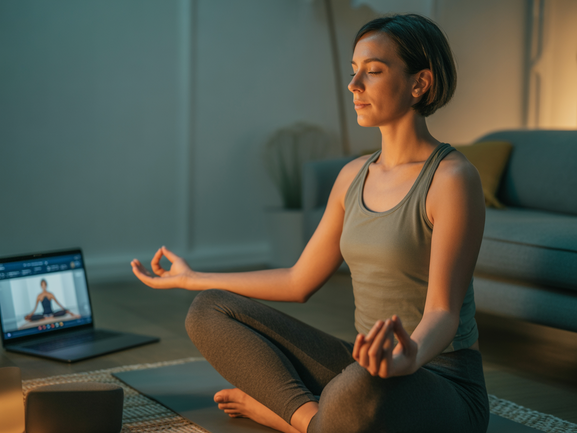How Yoga Philosophy Transforms Anxiety: Ancient Wisdom for Modern Peace
In our fast-paced digital world, anxiety has become an unwelcome companion for millions. While modern medicine offers various treatments, ancient wisdom provides profound insights that can transform our relationship with anxiety. Yoga philosophy, rooted in thousands of years of spiritual practice, offers practical tools for finding inner peace and mental clarity.
<p>At <a href="https://vitalizen.app/#about">Vitalizen.app</a>, we believe that understanding yoga's deeper principles can unlock powerful pathways to healing. Let's explore how these timeless teachings can help you navigate anxiety with grace and wisdom.</p>
<h2>Ancient Foundations: The Eight-Limbed Path of Healing</h2>
<p>Patanjali's <em>Yoga Sutras</em> outline the eight limbs of yoga, creating a comprehensive framework for mental well-being. These aren't just physical exercises—they're <strong>spiritual practices for anxiety</strong> management that address the root causes of mental unrest.</p>
<h3>The Yamas and Niyamas: Ethical Foundations</h3>
<p>The first two limbs establish ethical guidelines that naturally reduce anxiety-producing behaviors. When we practice <em>ahimsa</em> (non-violence) toward ourselves, we break free from self-criticism that fuels anxious thoughts. Similarly, <em>santosha</em> (contentment) teaches us to find peace in the present moment.</p>
<h3>Asana: The Physical Gateway</h3>
<p>While many view yoga as mere physical exercise, <strong>yoga philosophy mental health</strong> principles reveal that postures serve a deeper purpose. Through mindful movement, we learn to inhabit our bodies fully, creating a stable foundation for mental clarity.</p>
<blockquote>
<p>"The body benefits from movement, and the mind benefits from stillness." - Sakyong Mipham</p>
</blockquote>
<h2>Breath as Medicine: Pranayama for Anxiety Relief</h2>
<p>One of yoga's most powerful anxiety-relief tools is <em>pranayama</em>, or breath control. Scientific research has shown that specific breathing techniques can activate the parasympathetic nervous system, naturally reducing anxiety symptoms.</p>
<h3>Essential Breathing Techniques:</h3>
<ul>
<li><strong>Ujjayi Breath:</strong> Creates a calming rhythm that soothes the nervous system</li>
<li><strong>Nadi Shodhana:</strong> Balances the mind and reduces mental agitation</li>
<li><strong>4-7-8 Breathing:</strong> Quickly calms anxiety and promotes relaxation</li>
</ul>
<p>These techniques aren't just temporary fixes—they're <strong>mindfulness meditation benefits</strong> that rewire your relationship with stress and anxiety. Regular practice teaches your nervous system new patterns of response.</p>
<h2>The Science Behind Ancient Wisdom</h2>
<p>Modern neuroscience validates what yogis have known for centuries. Research published in the <a href="https://www.ncbi.nlm.nih.gov/pmc/articles/PMC3193654/" rel="nofollow noindex" target="_blank">Journal of Clinical Medicine</a> shows that regular yoga practice:</p>
<ul>
<li>Reduces cortisol levels by up to 23%</li>
<li>Increases GABA production, naturally calming the mind</li>
<li>Strengthens the prefrontal cortex, improving emotional regulation</li>
<li>Decreases amygdala reactivity, reducing fear responses</li>
</ul>
<p>These findings demonstrate that <strong>yoga for anxiety relief</strong> operates on multiple levels—physical, mental, and neurological.</p>
<h2>Practical Implementation: Your Daily Anxiety-Relief Toolkit</h2>
<p>Understanding philosophy is valuable, but transformation happens through consistent practice. Here's how to integrate these principles into your daily routine:</p>
<h3>Morning Foundation (10 minutes)</h3>
<ol>
<li>Begin with gratitude practice (santosha)</li>
<li>Five minutes of pranayama</li>
<li>Set intentions for mindful awareness</li>
</ol>
<h3>Midday Reset (5 minutes)</h3>
<ol>
<li>Brief meditation or breathing exercise</li>
<li>Body scan to release tension</li>
<li>Mindful transition between activities</li>
</ol>
<h3>Evening Integration (15 minutes)</h3>
<ol>
<li>Gentle yoga flow</li>
<li>Reflection on the day's lessons</li>
<li>Preparation for restorative sleep</li>
</ol>
<p>The beauty of an <strong>online yoga platform</strong> like <a href="https://vitalizen.app">Vitalizen</a> is that these practices become accessible anywhere, anytime. No more excuses about not having time or space for healing.</p>
<h2>Beyond Individual Practice: Community and Connection</h2>
<p>Yoga philosophy emphasizes that healing happens not in isolation, but through connection. When we share our journey with others, anxiety loses its power to isolate us. Virtual communities can provide the same supportive energy as traditional sanghas.</p>
<p>Through <a href="https://vitalizen.app/start-now">guided sessions and community features</a>, you can experience this collective healing energy from the comfort of your home.</p>
Frequently Asked Questions
Does yoga really help with anxiety?
Yes, extensive research confirms yoga’s effectiveness for anxiety relief. Studies show that regular practice can reduce anxiety symptoms by 30-50% within 8-12 weeks. The combination of physical movement, breath work, and mindfulness creates a powerful healing synergy.
How long does it take to see results?
Many people notice immediate calming effects after just one session, particularly with breathing techniques. However, lasting transformation typically occurs after 4-6 weeks of consistent practice. The key is regularity rather than duration—even 10 minutes daily creates meaningful change.
Can I practice yoga for anxiety at home?
Absolutely! Home practice can be even more effective for anxiety because you’re in a familiar, comfortable environment. Online platforms and guided sessions make it easy to maintain consistency without the pressure of public classes.
Which type of yoga is best for anxiety?
Gentle styles like Hatha, Yin, or Restorative yoga are particularly beneficial for anxiety. However, the most important factor is finding a practice that resonates with you. Some people find that more vigorous styles help discharge anxious energy effectively.
<h2>Your Journey Starts Now</h2>
<p>Anxiety doesn't have to define your life story. Through the wisdom of yoga philosophy and the convenience of modern technology, transformation is within reach. The ancient sages understood what we're rediscov

